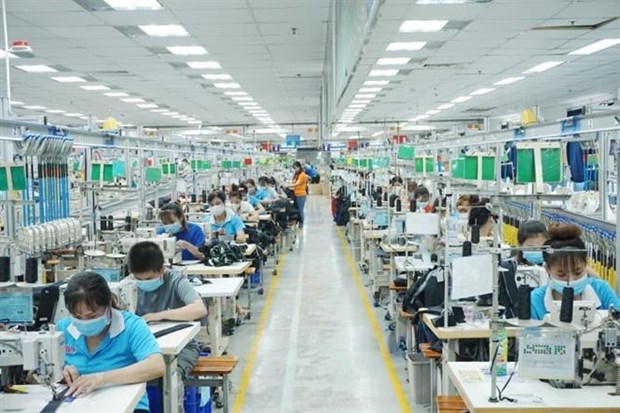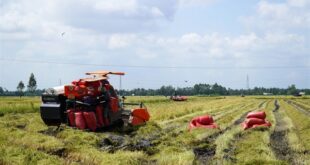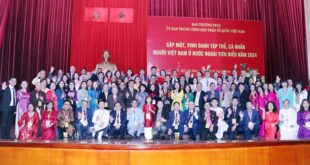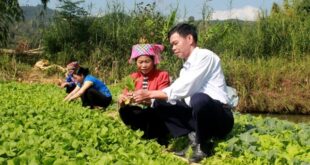
HÀ NỘI — Further empowering women will help improve Việt Nam’s garment and footwear sectors after the COVID-19 crisis, evidence from the ILO’s flagship programme has shown.
‘Better Work Việt Nam’ worked with the Việt Nam Chamber of Commerce and Industry (VCCI) and was supported by the Australian Government and other donors, to organise a national conference on women’s empowerment during the COVID-19 recovery in Hà Nội on Wednesday, towards a more resilient garment and footwear sectors.
Better Work Việt Nam is a unique partnership between the ILO and the International Finance Corporation (IFC), a member of the World Bank Group, with the ultimate goal of improving working conditions and boosting the competitiveness of these key export industries of Việt Nam.
Facing the COVID-19 crisis, the programme gave gender a greater priority in recognition of the disproportional impacts of the crisis on women’s health, care duties and discrimination.
According to an ILO study released in 2021, the COVID-19 pandemic did not only exacerbate existing gender inequalities – such as the double burden for women of working almost the same hours as men while spending more than twice as much time on housework – but also created new ones, which included a gender gap in the unemployment rate.
Better Work Việt Nam closely worked with its member factories to reduce risks of gender discrimination and develop guidelines, with emphasis on gender dimensions to support factories in handling suspensions, retrenchment and occupational safety and health during the pandemic.
In collaboration with IFC, during the first waves of COVID-19 in 2020, Better Work Việt Nam launched the GEAR (Gender Equality and Returns) project to help factories improve line-level productivity by equipping female operators with the skills needed to effectively perform as line leader.
In 2020-21, 80 per cent of GEAR participating factories reported higher productivity of the lines supervised by the women trained by GEAR.
“Many garment and footwear enterprises have been doing their best to create an equal working environment, giving women more opportunities,” VCCI Vice President Hoàng Quang Phòng said at the conference, acknowledging the impacts of the pandemic, the industrial revolution and the new generation of free trade agreements to jobs, incomes and security of female workers in the sectors.
“Robust evidence shows that empowering female workers drives and sustains compliance, increases productivity and profitability, improves dialogue, and improves health and education outcomes for workers and their families,” said Dan Rees, Director of Better Work Global.
“When women workers have a voice in dialogue at the workplace, compliance is higher and working conditions are better. When harassment and abusive working conditions are curbed, workers report higher well-being and factories’ profitability is higher.”
He noted that improving gender equality in the workplace is even more important than ever when building forward better from the pandemic. This is in line with the ILO’s Global Call to Action for a human-centred recovery from the COVID-19 crisis.
“The Australian Government is proud to support Better Work through our long-standing partnership with ILO. We recognise that the promotion of workplace gender equality, while a huge challenge globally, benefits everyone,” said Australian Ambassador Robyn Mudie.
“The Labour Code provisions that Việt Nam now has for employer-provided childcare, employer obligations relating to sexual harassment, and equal pay for equal work of equal value are key strategies for building back a better and more resilient garment and footwear sector,” she added.
Việt Nam’s garment and footwear industries are at the forefront of the country’s growth and development. They employ about five million people, among those 70 per cent are women.
The COVID-19 pandemic caused major disruptions in garment and footwear industries before they started to gear up in 2022, reaching US$7.21 billion and $4.79 billion in export values respectively in the first quarter.
Better Work Việt Nam is currently supporting more than 400 participating garment and footwear factories which employ 700,000 workers across the country to improve working conditions and boost competitiveness through its assessment, advisory and training services. — VNS
- Reduce Hair Loss with PURA D’OR Gold Label Shampoo
- Castor Oil Has Made a “Huge” Difference With Hair and Brow Growth
- Excessive hair loss in men: Signs of illness that cannot be subjective
- Dịch Vụ SEO Website ở Los Angeles, CA: đưa trang web doanh nghiệp bạn lên top Google
- Nails Salon Sierra Madre
 VnExpress News The News Gateway of Vietnam
VnExpress News The News Gateway of Vietnam





